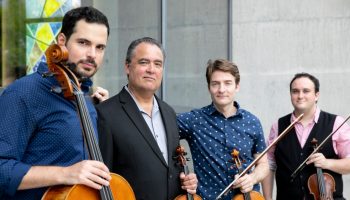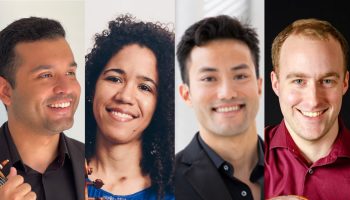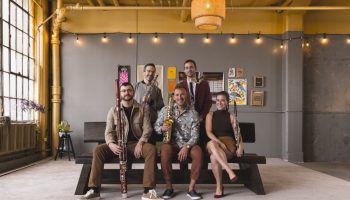
Alyssa Bump
contributing writer
The Chautauqua Symphony Orchestra Fellows will share a mosaic of diverse, cross-cultural repertoire at 4:15 p.m. Saturday in Elizabeth S. Lenna Hall.
The ensemble includes Gabriela Lara and Jesus Linarez on violin, Pedro Mendez and Camila Berg on viola, and Max Oppeltz on cello.
The CSO Fellows is a group born from the Chautauqua Symphony Fellowship Program, started in 2018 and expanded this summer through a partnership with the Sphinx Organization. With a keen focus on inclusiveness and diversity, the program has expanded this year to 10 fellows.
“It’s a refresher for the orchestra when they have young people with different cultures from different places,” Mendez said. “There’s a door that is opened for more people to learn about Chautauqua. … So many people don’t know what Chautauqua is and how powerful it is.”
This season is Oppeltz’s third year as a fellow, and said he is excited to collaborate with his friends through chamber music.
“Having a little balance as musicians is the best thing,” Oppeltz said. “I love orchestra, but I need to have some chamber music thrown in there.”
Both Mendez and Oppeltz are from Venezuela, and Mendez noted how his first season as a fellow has allowed him to experience an “interchange of culture.”
This Saturday’s program includes Samuel Coleridge-Taylor’s 5 Fantasiestücke, for string quartet, Op. 5 and Antonin Dvořák’s String Quintet No. 3 in E Flat Major, Op. 97. Coleridge-Taylor’s 5 Fantasiestücke will be performed by Lara, Linarez, Mendez and Oppeltz. Berg will join the CSO Fellows on stage for Dvořák’s String Quintet.
CSO Fellows want to present a program with an “underrepresented composer and a big name composer,” according to Mendez; Coleridge-Taylor and Dvořák fit the bill. Coleridge-Taylor came from a mixed racial background: his father was African and his mother was English. He was still a student in 1895 when he composed 5 Fantasiestücke, which translates to “fantasy pieces.”
“Every piece has a very different character,” Mendez said. “Out of the five movements, each of them has totally different emotions and different feelings with a lot of color and detail.”
Dvořák is one of Mendez’s favorite composers, and he believes his String Quintet is interesting because it was written during the summer the Czech composer spent in Spillville, Iowa.
“Dvořák is a cool composer because he influenced a lot of American composers, but he was also influenced by African American tunes and hymns in his own music,” Oppeltz said. “He’s part of this really cool loop of influence in American music. It’s always cool to program him and compare his sounds to the sounds of other composers because he’s so pivotal.”
Dvořák’s String Quintet invokes a sense of “longing,” according to Oppeltz.
“He wrote about missing home, but he did it with this new voice that he found (in America),” Oppeltz said. “He was missing home while embracing the sounds of the place where he was.”
Mendez is excited to bring “energy and freshness” to the chamber music series as Venezuelan and Latinx fellows.
“(We will) expose (the audience) to a different way that music is normally presented,” Oppeltz said. “… We’ll be having a lot of fun, and it’s going to be really obvious. I think that’s contagious.”




